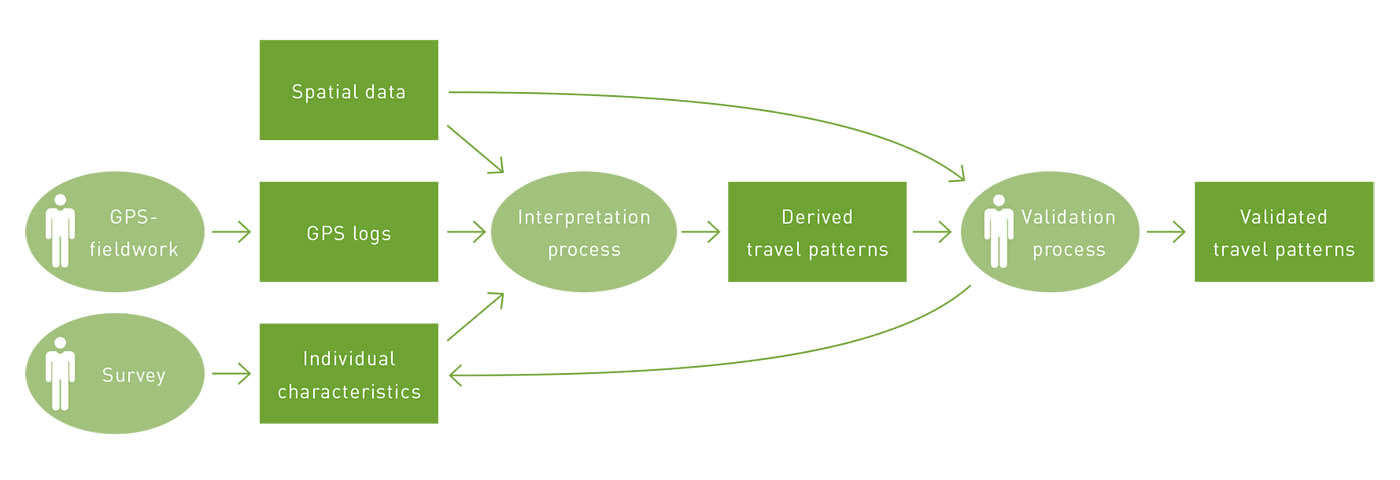Downloads
DOI:
https://doi.org/10.7480/rius.1.201Abstract
This chapter contributes to the improvement of GPS-based travel surveying by introducing a combined method of GPS, GIS and web-based user interaction, which has been applied in large- scale fieldwork in the netherlands. With over 1000 participants, as far as we know, this is the first time that a GPS-based method that measures travel mode choice as well as the location and type of destinations that are visited has been used on such a large scale. The chapter focuses in particular on the identification of travel modes and destinations, which is still an under-researched issue.
Our approach concentrates on the issue of deriving and validating the purpose of trip destinations and travel modes, while also allowing reliable multi-day data collection. The method consists of an interpretation process and a validation process. The interpretation process uses spatial data (e.g. railways, shops) and characteristics of the respondents (e.g. home address, possession of cars) to interpret data from the logs. The travel behaviour data that result from this interpretation round can be adjusted and added to by the respondents in a validation application. The link between both processes is interactive; when new individual characteristics (e.g. the address of a friend’s house) are entered by the respondents, these characteristics will be used for further interpretation of the data.
The remainder of this chapter is structured as follows. The following section gives an overview of the advantages and drawbacks of current GPS-based data collection methods that are suitable for measuring choice of travel mode and/or trip destinations. The subsequent section describes the GPS-based method that we developed and in section four the value of our method is evaluated by presenting the results of the fieldwork we recently undertook. The results are compared with results from an internet survey that was carried out at an earlier date and also with the Dutch Travel Survey (DTS) that uses paper diaries. The chapter ends with conclusions on the use of GPS-based methods for the collection of travel behaviour data and a discussion of future possibilities.
How to Cite
Published
Issue
Section
License
Copyright (c) 2008 Wendy Bohte, Kees Maat, Wilko Quak

This work is licensed under a Creative Commons Attribution 4.0 International License.
References
Arentze, T., Dijst, M., Dugundji, E., Chang-Hyeon, J., Kapoen, L., Krygsman, S., Maat, K. and Timmermans, H. (2001) New Activity Diary Format: Design and Limited Empirical Evidence, Transportation Research Record: Journal of the Transportation Research Board, No. 1768, TRB, National Research Council, Washington D.C., pp. 79-88.
AW-MON (2006) Mobiliteitsonderzoek Nederland, Rijkswaterstaat Adviesdienst Verkeer en Vervoer, Rotterdam.
Boarnet, M.G. and Sarmiento, 5. (1998) Can land use Policy Really Affect Travel Behaviour? A Study of the link between Non-Work Travel and Land Use Characteristics, Urban Studies 3517], 1155-1169.
Bohte, W., Maat, K. and van Wee, B. (2007) Residential self-selection, the effect of travel-related attitudes and lifestyle orientation on residential location choice; evidence trom the Netherlands. Paper presented at the 11th World Conference on Transport Research, Berkeley.
Chung, E-H. and Shalaby A. (2005) A Trip Reconstruction tool for GPS-based Personal Travel Surveys. Transportation Planning and Technology, 2815], 381-401.
Doherty, S., Papinski, D. and Lee-Gosselin, M. (2006) An lnternet-Based Prompted Recall Diary with GPS Activity Trip Detection: System Design. Presented at 85th Annual Meeting of the Transportation Research Board, Washington, D.C ..
Forest, T.L. and Pearson, D.F. (2005) A comparison of trip determination methods in GPS-enhanced household travel surveys. Presented at 84th Annual Meeting of the Transportation Research Board, Washington, D.C ..
Golob, T.F. (2000) A Simultaneous Model of Household Activity Participation and Trip Chain Generation, Transportation Research B, 34, pp. 355-376.
Kochan, B., Bellemans, T., Janssens, D. and G. Wets. (2006) Dynamic Activity Travel Diary Data Collection, Using a GPS Enabled Personal Digital Assistant. Presented at the lnnovations in Travel Modelling Conference, Austin, 2006.
Krizek, K.J. 12003] Neighborhood Services, Trip Purpose, and Tour-Based Travel, Transportation, 30, pp. 387-410.
Maat, K. and Timmermans, H. 12006] lnfluence of Land Use on Tour Complexity, a Dutch case, Transportation Research Record: Journal of the Transportation Research Board, No. 1977, TRB, National Research Council, Washington D.C., pp. 234-241.
Ohmori, N., Nakazato, M. and Harata, N. (2005) GPS Mobile Phone-Based Activity Diary Survey. Proceedings of the Eastern Asia Society lor Transportation Studies, 5, pp. 1104-1115.
Steer Davies Gleave and Geostats (2003) The Use of GPS to lmprove Travel Data. Study report. Prepared for the DTLR New Horizons Programme, submitted to the London Department for Transport, London.
Schönfelder, 5., Axhausen, K.W., Antille, N. and Bierlaire, M. 12002] Exploring the Potentials of Automatically Collected GPS Data lor Travel Behaviour Analysis - a Swedish Data Source. In, J. Möltgen and A. Wytzisk, eds, G/-Technologien lür Verkehr und Logistik, lfGlprints, 13, Institut für Geoinformatik, Universität Münster, Münster, pp.155-179.
Stopher, P.R. and Collins, A. (2005) Conducting a GPS Prompted Recall Survey over the Internet. Presented at 84th Annual Meeting of the Transportation Research Board, Washington, D.C ..
Stopher, P.R. and Wilma!, C.G. (2000) Same new approaches to designing household tra vel surveys - time use diaries and GPS. Presented at the 79th Annual Meeting of the Transportation Research Board, Washington, D.C ..
Tsui, A. and Shalaby, A. (2006) Enhanced System for Link and Mode identification for Personal Travel Surveys Based on Global Positioning Systems, Transportation Research Record: Journal of the Transportation Research Board, No. 1972, TRB, National Research Council, Washington D.C..
Wolf, J., Guensler, R. and Bachman, W. (2001) Elimination of the Travel Diary: an Experiment to Derive Trip Purpose from GPS Travel Data. Presented at 80th Annual Meeting of the Transportation Research Board, Washington, D.C..
Wolf, J., Oliviera, M. and Thompson, M. (2003) Impact of Underreporting on Mileage and Travel Time Estimates, Results from Global Positioning System-enhanced Household Travel Survey, Transportation Research Record: Journal of the Transportation Research Board, No. 1854, TRB, National Research Council, Washington D.C., pp. 189-198.




